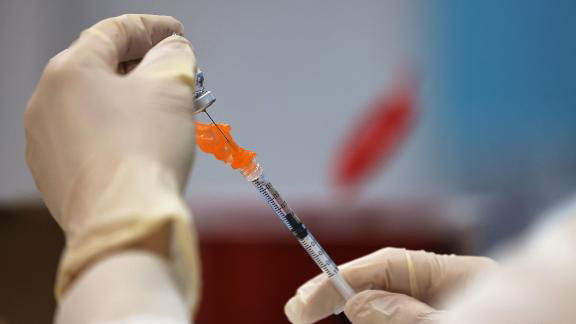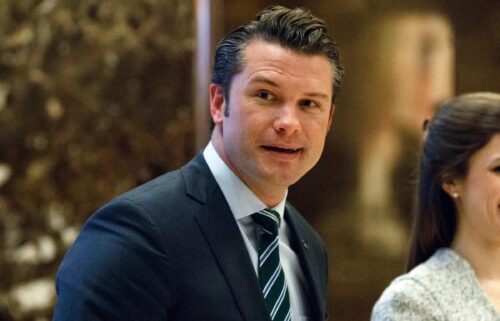White House turns to young people for help convincing their peers to get vaccinated

By Rachel Janfaza, CNN
Braxton Simpson made a joyous announcement to her 264 YouTube subscribers this spring.
“Fully vaccinated!” Simpson said, drawing out the final word as she bounced with glee.
“I wanted to take you guys along this process to help you make a better and more informed decision,” she told her viewers in the video, which describes her experience getting vaccinated against Covid-19.
But while Simpson — who is 22 and from Atlanta — was excited to get her Covid-19 vaccine, many young Americans are not as eager.
The White House this week acknowledged the US would fall short of President Joe Biden’s July Fourth Covid-19 vaccination goals, saying the country has more work to do to get younger Americans vaccinated. The President had aimed to get 70% of US adults at least one Covid-19 vaccine shot by Independence Day.
Vaccine coverage among young adults has been lower and is increasing more slowly over time than in other age groups in the United States, and the intent to be vaccinated is lower among younger adults, according to studies published Monday by the US Centers for Disease Control and Prevention.
If the weekly pace of vaccinations continues at the same rate from the week of May 22, only 57.5% of adults under age 30 will have received at least one dose of a Covid-19 vaccine by the end of August.
From the White House Covid-19 College Vaccine Challenge — an initiative to get colleges involved in the push to vaccinate young Americans — to a partnership with Snapchat, and incentives such as free bagels, burritos and meditations for those who have been vaccinated, the Biden administration has taken a number of steps to reach young Americans with information about the importance of getting the vaccine.
Although incentives may motivate some young people to get vaccinated, others say the best way to reach young Americans is through their peers.
“It’s more personal,” said Isaiah Martin, a 22-year-old recent graduate of the University of Houston. “[Young people] may see the President or [a] congresswoman on television, but they don’t personally know them. When a peer gets it, they see them face to face and can have conversations about their experience.”
“I think friends are one of the best ways to reach young people,” said Sophia Shapiro, who’s 19 years old and a student at the University of Pittsburgh. “Especially for college-age people who might not be living at home with their families, their friends are often times their sources of news and information.”
Recognizing this, the White House built a Covid-19 student community corps of young leaders and is inviting any interested students 16 years old and up to join.
While the Biden administration has for months worked with grassroots organizations to spread information about the vaccine across the country, the student corps is an additional step targeted at reaching younger Americans.
According to US Surgeon General Dr. Vivek Murthy, who led a kickoff call with the student corps last week, the group was created to equip young people with tools to go into their communities and talk about getting vaccinated.
“The goal of the student community corps is to one, recognize the power that young people have to not only get vaccinated, but to help their peers get vaccinated. And it’s also to recognize that, inherent in that power, is the fact that young people often want to hear from other young people,” Murthy told reporters on Thursday.
“The student community corps is really intended to provide young people with the resources and support that they need to go out there and talk to their classmates, to their family members, and to their friends and help them get the information they need to get vaccinated. And sometimes that’s information about the nature of the vaccine, sometimes it’s information about the variants, the Delta variant, sometimes it’s information about long Covid symptoms and the risks of going unvaccinated,” Murthy said.
On the corps’ kickoff call, Murthy said he heard from students who were already “leading efforts in their communities: knocking on doors, doing phone banks, and text banking as well.”
Simpson — who is also a vaccine ambassador with Rise, a youth-focused organization that launched a vaccine education campaign in Atlanta and Detroit earlier this month — now serves on the White House’s student corps.
Since becoming part of the corps, Simpson joined the group’s call with Murthy and spoke at a vaccine event featuring Vice President Kamala Harris at Clark Atlanta University.
This week, she utilized the power Murthy referenced when she helped her cousin, Dylan McCall, get vaccinated.
“I had been working on him to get it, but from a cultural standpoint there was a little bit of distrust there,” she said, adding that there has been skepticism about the vaccine within the Black community.
“I talked to him about how Covid-19 impacts our family, our friends. We saw deaths in our immediate circle. I talked to him about how it’s everybody’s responsibility to protect each other.”
For his part, McCall, who is 20 and also from Atlanta, said, “Talking to my cousin eased my nerves.”
“I trust my cousin, I know my cousin, and I am attached to her experiences. Celebrities are cool, but I can’t relate to them as much. Hearing it from Braxton firsthand really made the difference,” he said.
According to Murthy, “there’s no one silver bullet” that will motivate all Americans to get vaccinated.
“What we’ve learned over the last several months is that you need to take a multi-pronged approach,” Murthy said.
“Taken together, I do believe the variety of incentives we have, the variety of access initiatives that we have taken and the community based grassroots education campaign that we’ve embarked on, that these will be effective in continuing to move forward with our vaccination campaign,” he said.
The-CNN-Wire
™ & © 2021 Cable News Network, Inc., a WarnerMedia Company. All rights reserved.
CNN’s Kaitlan Collins, Kate Sullivan and Betsy Klein contributed to this report.

